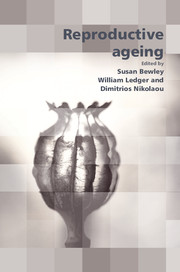Book contents
- Frontmatter
- Contents
- Participants
- Declarations of personal interest
- Preface
- SECTION 1 BACKGROUND TO AGEING AND DEMOGRAPHICS
- SECTION 2 BASIC SCIENCE OF REPRODUCTIVE AGEING
- SECTION 3 PREGNANCY: THE AGEING MOTHER AND MEDICAL NEEDS
- SECTION 4 THE OUTCOMES: CHILDREN AND MOTHERS
- SECTION 5 FUTURE FERTILITY INSURANCE: SCREENING, CRYOPRESERVATION OR EGG DONORS?
- SECTION 6 SEX BEYOND AND AFTER FERTILITY
- SECTION 7 REPRODUCTIVE AGEING AND THE RCOG: AN INTERNATIONAL COLLEGE
- SECTION 8 FERTILITY TREATMENT: SCIENCE AND REALITY – THE NHS AND THE MARKET
- SECTION 9 THE FUTURE: DREAMS AND WAKING UP
- 31 In our wildest dreams: making gametes
- 32 The future: dreams
- 33 Managing expectations and achieving realism: the individual journey from hope to closure
- 34 Managing expectations and achieving realism: the ‘realpolitik’ of reproductive ageing and its consequences
- 35 The future: waking up
- SECTION 10 CONSENSUS VIEWS
- Index
35 - The future: waking up
from SECTION 9 - THE FUTURE: DREAMS AND WAKING UP
Published online by Cambridge University Press: 05 February 2014
- Frontmatter
- Contents
- Participants
- Declarations of personal interest
- Preface
- SECTION 1 BACKGROUND TO AGEING AND DEMOGRAPHICS
- SECTION 2 BASIC SCIENCE OF REPRODUCTIVE AGEING
- SECTION 3 PREGNANCY: THE AGEING MOTHER AND MEDICAL NEEDS
- SECTION 4 THE OUTCOMES: CHILDREN AND MOTHERS
- SECTION 5 FUTURE FERTILITY INSURANCE: SCREENING, CRYOPRESERVATION OR EGG DONORS?
- SECTION 6 SEX BEYOND AND AFTER FERTILITY
- SECTION 7 REPRODUCTIVE AGEING AND THE RCOG: AN INTERNATIONAL COLLEGE
- SECTION 8 FERTILITY TREATMENT: SCIENCE AND REALITY – THE NHS AND THE MARKET
- SECTION 9 THE FUTURE: DREAMS AND WAKING UP
- 31 In our wildest dreams: making gametes
- 32 The future: dreams
- 33 Managing expectations and achieving realism: the individual journey from hope to closure
- 34 Managing expectations and achieving realism: the ‘realpolitik’ of reproductive ageing and its consequences
- 35 The future: waking up
- SECTION 10 CONSENSUS VIEWS
- Index
Summary
Siladitya Bhattacharya: Thanks for two excellent presentations. So, what we are getting clearly is that the message needs to go out to people that there is a finite time over which women are able to reproduce. But how can that message be transmitted to the population without government support?
Zoe Williams: It would have to be with government support because you need some kind of neutrality. The way the media presents it is very overheated. A lot of people in the left-wing press present this (and I have been guilty myself) as a conspiracy against women, to pressurise them into early childbearing. It is not a conspiracy against women, but that is what if feels like when being constantly badgered. It has to come from a neutral body. What do you think?
Kate Brian: I think that is true, but at the moment people are really not aware of it. There are a lot of people who still think that it is vaguely ‘made up’. People are not really aware of the realities, partly because there is still this idea that ‘if I leave it too late I can still go and have fertility treatment’. People do still think that is a kind of safety net.
Stephen Hillier: I wonder to what extent government policy on population development takes into account or relies upon the wave of new manpower or womanpower from the European Union accession states?
Keywords
Information
- Type
- Chapter
- Information
- Reproductive Ageing , pp. 347 - 350Publisher: Cambridge University PressPrint publication year: 2009
